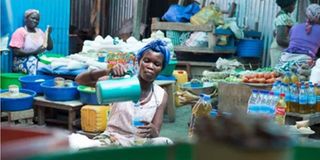South Sudan traders look to Central Bank to stem forex losses

A market in Juba. South Sudan relies on imports from Kenya, Sudan and Uganda, a trade that puts pressure on the local currency. PHOTO | AFP
What you need to know:
The South Sudan pound has been weakening against the dollar since September after the payment of several months of salaries in arrears
Juba.Traders and businesses are hoping for respite in the foreign exchange market after the Bank of South Sudan said it would inject dollars into the market to protect the local currency.
The South Sudan pound has been weakening against the dollar since September after the payment of several months of salaries in arrears.
“The pound has lost value in the past two months due to the impact of the recent payment of salaries,” said Central Bank Governor Dier Tong.
About SSP15 billion ($115.2 million) or 31 per cent of the currency in circulation was injected into the economy for the payments.
The government secured $400 million financing from the Africa Export-Import Bank in October to pay the salaries and finance infrastructure projects.
The managing director and CEO of Co-operative Bank of South Sudan Elijah Wamalwa said the high liquidity in the market would stoke inflation without the Central Bank’s intervention.
Foreign businesses operating in South Sudan have traditionally faced challenges in repatriating profits or honouring contracts, at one time forcing Uganda to intervene on behalf of its traders.
“South Sudan is in high need for dollars for importation and the likes. If you have high demand and low supply for dollars, then the prices will go up as there is a lot of money in the economy,” he said, adding that the mopping up of the South Sudan pound would stem a likely devaluation.
He called on the Central Bank to mop up extra cash from the economy through instruments like Treasury bills and Treasury bonds.
“In a fractured market, the Central Bank could offer an opportunity for people to invest their extra cash and earn interest income,” said Mr Wamalwa.
In his decision to intervene, Mr Dier said the market was reacting to liquidity. Since September, the South Sudan Pound has fluctuated in a narrow range of between 130.25 units and 130.26 units to the dollar.
“To reduce the liquidity in the market, the Bank of South Sudan will intervene in the foreign exchange market by selling dollars. We have allocated a significant amount of dollars for fuel importation and commodities as well as for medicine,” said Mr Dier.
Abdalla Ahmed, an importer based in Konkonyo market in Juba, called for fair and transparent release of dollars into the market.
“We normally find ourselves on the receiving end when exchanging pounds for dollars,” said Mr Ahmed, who brings in goods from Uganda.
Mama Sarah, a trader at Juba’s Custom market said previous interventions only benefitted a few individuals.
“These could be friends of the Central Bank and may not solve the problem of a depreciating pound,” she said.
To address such fears Mr Dier said the hard currency would be channelled through forex bureaus.
Before the 2013 civil war, South Sudan earned almost all of its revenue — 98 per cent — from selling oil.
Production has since halved after rebels took over some oilfields while others were damaged in the war. This was aggravated by a tumble in global oil prices.
South Sudan relies heavily on imported goods from Kenya, Sudan and Uganda, a trade that also puts pressure on the local currency. However, businesses in these countries have also been complaining that the trade is hampered by lack of foreign exchange in Juba.
Insecurity along major trade routes has also aggravated a food crisis in the face of drought.



